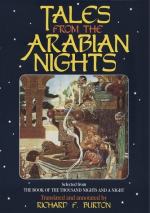[FN#115] The camel carries the Badawi’s corpse to the cemetery which is often distant: hence to dream of a camel is an omen of death.
[FN#116] Koran xxiv 39. The word “Sarab” (mirage) is found in Isaiah (xxxv. 7) where the passage should be rendered “And the mirage (sharab) shall become a lake” (not, “and the parched ground shall become a pool"). The Hindus prettily call it “Mrigatrishna” = the thirst of the deer.
[FN#117] A name of Allah.
[FN#118] Arab. “Kintar"=a hundredweight (i.e. 100 Ibs.), about 98 3/4 Ibs. avoir. Hence the French quintal and its congeners (Littre).
[FN#119] i.e. “from Sham (Syria) to (the land of) Adnan,” ancestor of the Naturalized Arabs that is, to Arabia.
[FN#120] Koran lii. 21. “Every man is given in pledge for that which he shall have wrought.”
[FN#121] There is a constant clerical confusion in the texts between “Arar” (Juniperus Oxycedrus used by the Breeks for the images of their gods) and “Marmar” marble or alabaster, in the Talmud “Marmora” = marble. evidently from {Greek letters} = brilliant, the brilliant stone.
[FN#122] These Ifritical names are chosed for their bizarrerie. “Al-Dahish” = the Amazed; and “Al-A’amash” = one with weak eyes always watering.
[FN#123] The Arabs have no word for million; so Messer Marco Miglione could not have learned it from them. On the other hand the Hindus have more quadrillions than modern Europe.
[FN#124] This formula, according to Moslems, would begin with the beginning “There is no ilah but Allah and Adam is the Apostle (rasul = one sent, a messenger, not nabi = prophet) of Allah.” And so on with Noah, Moses, David (not Solomon as a rule) and Jesus, to Mohammed.
[FN#125] This son of Barachia has been noticed before. The text embroiders the Koranic chapter No. xxvii.
[FN#126] The Bresl. Edit. (vi. 371) reads “Samm-hu"=his poison, prob. a clerical error for “Sahmhu"=his shaft. It was a duel with the “Shihab” or falling stars, the meteors which are popularly supposed, I have said, to be the arrows shot by the angels against devils and evil spirits when they approach too near Heaven in order to overhear divine secrets.
[FN#127] A fancy sea from the Lat. “Carcer” ( ?).
[FN#128] Andalusian = Spanish, the Vandal-land, a term accepted by the Moslem invader.
[FN#129] This fine description will remind the traveller of the old Haurani towns deserted since the sixth century, which a silly writer miscalled the “Giant Cities of Bashan.” I have never seen anything weirder than a moonlight night in one of these strong places whose masonry is perfect as when first built, the snowy light pouring on the jet-black basalt and the breeze sighing and the jackal wailing in the desert around.
[FN#130] “Zanj,” I have said, is the Arab. form of the Persian “Zang-bar” (=Black-land), our Zanzibar. Those who would know more of the etymology will consult my “Zanzibar,” etc., chaps. i.




